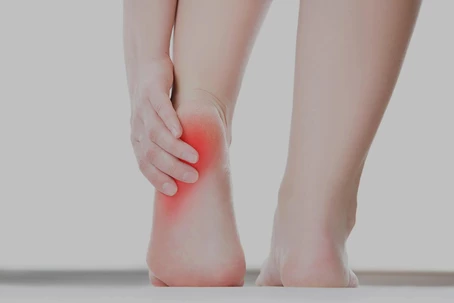Pronounced Plan-tar Fash-ee-eye-tis
Are you hobbling around first thing in the morning because your heels hurt? It might be plantar fasciitis.
Plantar fasciitis (or fasciopathy) is one of the most common causes of heel pain in adults. It is most commonly described as heel pain in the morning, it improves as the body warms up but returns by the end of the day. You might have good and bad days but how long have you been waiting for your heel or arch pain to fix itself?
What is the Plantar Fascia?
 The plantar fascia is a thick gristle band of connective tissue that connects the heel bone (calcaneus) and the toes on the plantar surface (bottom) of the foot. Its primary job is to stabilise the longitudinal arch of the foot.
The plantar fascia is a thick gristle band of connective tissue that connects the heel bone (calcaneus) and the toes on the plantar surface (bottom) of the foot. Its primary job is to stabilise the longitudinal arch of the foot.Plantar fasciitis occurs when excess strain on the plantar fascia causes tissue damage at the attachment into the calcaneus. It usually occurs as an overuse injury caused by repetitive strain during day-to-day activities but can also be from an impact injury such as a jump from height.
Plantar fasciitis – Common Risk Factors
-
Increasing Age – as we get older the flexibility and resilience of the plantar fascia decreases.
-
Foot structure – certain foot types can make an individual more prone to developing plantar fasciitis. A flat foot (pronated) results in the plantar fascia having to span a longer distance due to the collapsing arch which causes excess strain. Whilst a high-arch foot (supinated) has less flexibility and poor shock absorption which gets transferred through the plantar fascia as a jarring motion. Often a thorough biomechanical assessment is needed as there is usually multiple contributing factors.
-
Footwear – there are several characteristics to consider. For example, when the calf muscle contracts to lift the heel bone off the ground strain is placed on the plantar fascia’s attachment into the heel bone. This load can be reduced by choosing a shoe with a heel height of approximately 5-10mm and avoiding barefoot or flat shoes.
-
Activity Levels – a sudden change in activity levels such as returning to running without warming up or not gradually increasing distance can lead to excess strain on the plantar fascia as your foot muscles have not had time to gain strength.
-
Occupation – the physical demands of your job including prolonged standing on hard floors, carrying heavy weight or footwear requirements (construction workers in steel-capped boots or flight attendants in high heels) can contribute.
-
Surfaces – standing, walking or running on surfaces which have no compression, like concrete, can aggravate plantar fasciitis because it increases shock attenuation demands on the foot. Consider surfaces at home (tiles), work and during physical activity.
-
Bodyweight – excess bodyweight increases load through the plantar fascia.
Why hasn’t it healed?
As most overuse injuries have a gradual onset of pain, we often think the pain will also gradually go away and the problem will fix itself. By the time most people start investigating treatment options the pain has been present for months, become chronic and is affecting their day-to-day activities. Once aggravated, the plantar fascia is slow to heal because it has a poor blood supply (our blood carries nutrients required for healing). It is also attempting to heal whilst still being under constant load as we carry out our normal activities that require standing and walking.
You may have also heard that plantar fasciitis is an ‘episodal condition’ and will eventually resolve – this is true. Everyone will have symptoms for a different amount of time depending on contributing factors and severity but if you’re experiencing daily heel pain for months or years it can be a long time to wait!
Why attend a Podiatry Appointment?
It is important to see a podiatrist for a professional assessment and diagnosis as heel pain can have other causes such as ‘fat pad contusion’ or ‘tarsal tunnel syndrome’. If required your podiatrist can send you for x-ray or ultrasound investigation. You want to make sure you’re putting your time into treating the right condition!
A full lower limb biomechanical assessment will be conducted to identify contributing factors to your heel pain. A treatment plan will then be formed to address your specific contributing factors and treatment goals. The podiatrist will give advice on footwear, strengthening and stretching and may also apply strapping, conduct dry needling sessions or recommend the use of orthotic devices.
To start walking around with the bounce back in your step phone Armidale Podiatry to book an appointment today – 02 6771 9142 or book an appointment online (NEEDS LINK).
